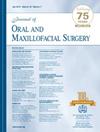因轻微牙源性感染住院的儿童患者术后可能无需使用抗生素。
IF 2.3
3区 医学
Q2 DENTISTRY, ORAL SURGERY & MEDICINE
引用次数: 0
摘要
背景:过度使用抗生素是医疗保健领域日益严重的问题。目的:本研究旨在比较因前庭间隙牙源性感染住院的儿科患者术后使用抗生素与未使用抗生素的治疗效果:这项前瞻性队列研究在以色列波利亚的Baruch Padeh "Tzafon "医疗中心进行(2010年1月至2015年12月为回顾性研究,2018年11月至2019年12月为前瞻性研究)。样本包括 522 名儿科患者(预测因子/因变量:主要预测因素是入院时决定的术后抗生素管理(给药与不给药):主要结果变量:主要结果变量是住院时间(LOS),分为短期(1-2 天)和长期(≥3 天)。住院时间被选为康复时间和症状缓解的代表,反映了治疗方法的整体疗效:收集人口统计学、临床和实验室数据:分析:采用描述性统计、学生 t 检验、χ2 检验和多变量逻辑回归(P 结果:在 522 名患者(411 名对照组,111 名研究组)中,各组的平均住院日相似:1.7 ± 0.91 天(对照组)对 1.67 ± 0.9 天(研究组)(P = .76)。短期住院时间差异不大(90.99% 对 87.10%,P = .32)。多变量分析表明,暂停使用抗生素与延长住院时间之间没有关联(OR = 0.92,95% CI:0.45 至 1.89,P = .82),但发现年龄(OR = 1.11,95% CI:1.02 至 1.21,P = .02)和初始白细胞计数(OR = 1.08,95% CI:1.01 至 1.15,P = .03)是延长住院时间的预测因素:牙源性感染的儿科患者术后停用常规抗生素不会对住院时间产生显著影响。虽然住院时间不是临床结果的直接衡量标准,但它可以作为康复的替代指标。这种方法可以在不影响患者护理的情况下促进抗生素监管工作,但未来还需要对临床结果进行直接测量的研究来证实这些发现。本文章由计算机程序翻译,如有差异,请以英文原文为准。
Postoperative Antibiotics May Be Unnecessary in Pediatric Patients Hospitalized With Minor Odontogenic Infections
Background
Antibiotic overuse is a growing concern in health care. For pediatric odontogenic infections, the necessity of postoperative antibiotics lacks clear, evidence-based guidelines.
Purpose
The purpose of this study was to compare treatment outcomes between pediatric patients hospitalized with vestibular space odontogenic infections who received postoperative antibiotics and those who did not.
Study Design, Setting, Sample
This ambispective cohort study was conducted at the Baruch Padeh “Tzafon” Medical Center, Poriya, Israel (January 2010-December 2015 for retrospective and November 2018-December 2019 for prospective). The sample included 522 pediatric patients (<15 years) hospitalized for odontogenic infections requiring surgical intervention. Patients with nonodontogenic infections, compromised immune systems, or infections involving deeper spaces were excluded.
Predictor/Independent Variable
The primary predictor was postoperative antibiotic management (administration vs no administration), decided at hospital admission.
Main Outcome Variable(s)
The primary outcome variable was hospital length of stay (LOS), categorized as short (1 to 2 days) or extended (≥3 days). LOS was chosen as a proxy for recovery time and symptom resolution, reflecting the overall efficacy of the treatment approach.
Covariates
Demographic, clinical, and laboratory data were collected.
Analyses
Descriptive statistics, Student t-tests, χ2 tests, and multivariable logistic regression were used (P < .05).
Results
Of 522 patients (411 control, 111 study), mean LOS was similar between groups: 1.7 ± 0.91 days (control) versus 1.67 ± 0.9 days (study) (P = .76). Short stays were not significantly different (90.99 vs 87.10%, P = .32). Multivariable analysis showed no association between withholding antibiotics and extended stay (odds ratio [OR] = 0.92, 95% confidence interval [CI]: 0.45 to 1.89, P = .82), but identified age (OR = 1.11, 95% CI: 1.02 to 1.21, P = .02) and initial white blood cell count (OR = 1.08, 95% CI: 1.01 to 1.15, P = .03) as predictors of extended stay.
Conclusion and Relevance
Withholding routine postoperative antibiotics in pediatric patients with odontogenic infections does not significantly impact length of hospital stay. While length of stay is not a direct measure of clinical outcome, it serves as a proxy for recovery. This approach may contribute to antibiotic stewardship efforts without compromising patient care, though future studies with direct clinical outcome measures are needed to confirm these findings.
求助全文
通过发布文献求助,成功后即可免费获取论文全文。
去求助
来源期刊

Journal of Oral and Maxillofacial Surgery
医学-牙科与口腔外科
CiteScore
4.00
自引率
5.30%
发文量
0
审稿时长
41 days
期刊介绍:
This monthly journal offers comprehensive coverage of new techniques, important developments and innovative ideas in oral and maxillofacial surgery. Practice-applicable articles help develop the methods used to handle dentoalveolar surgery, facial injuries and deformities, TMJ disorders, oral cancer, jaw reconstruction, anesthesia and analgesia. The journal also includes specifics on new instruments and diagnostic equipment and modern therapeutic drugs and devices. Journal of Oral and Maxillofacial Surgery is recommended for first or priority subscription by the Dental Section of the Medical Library Association.
 求助内容:
求助内容: 应助结果提醒方式:
应助结果提醒方式:


